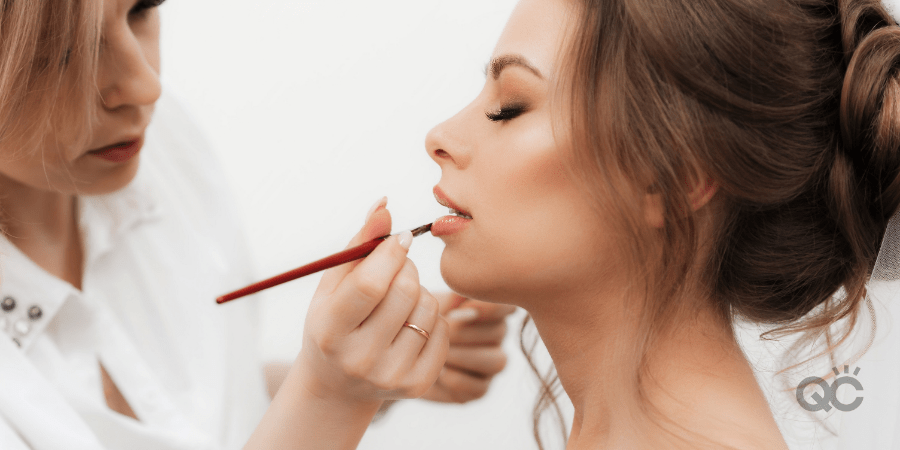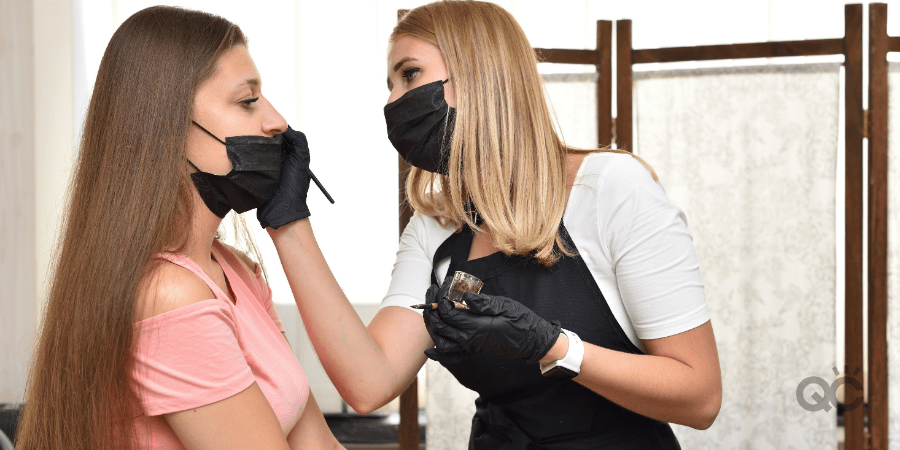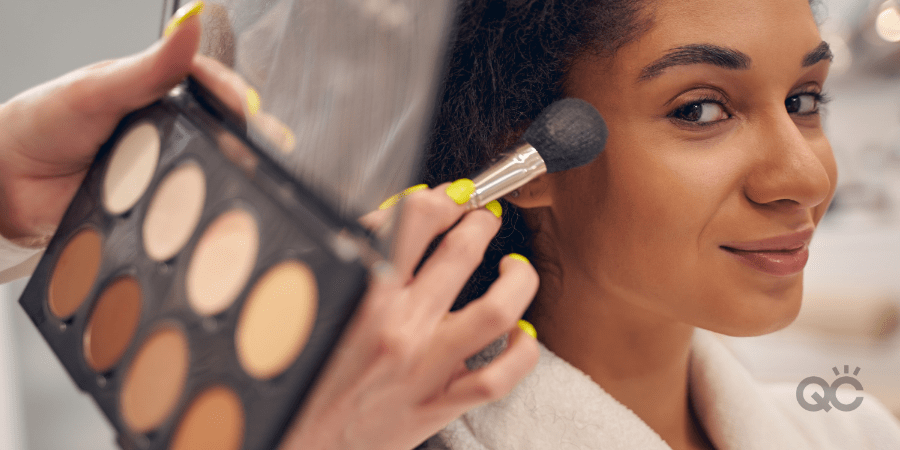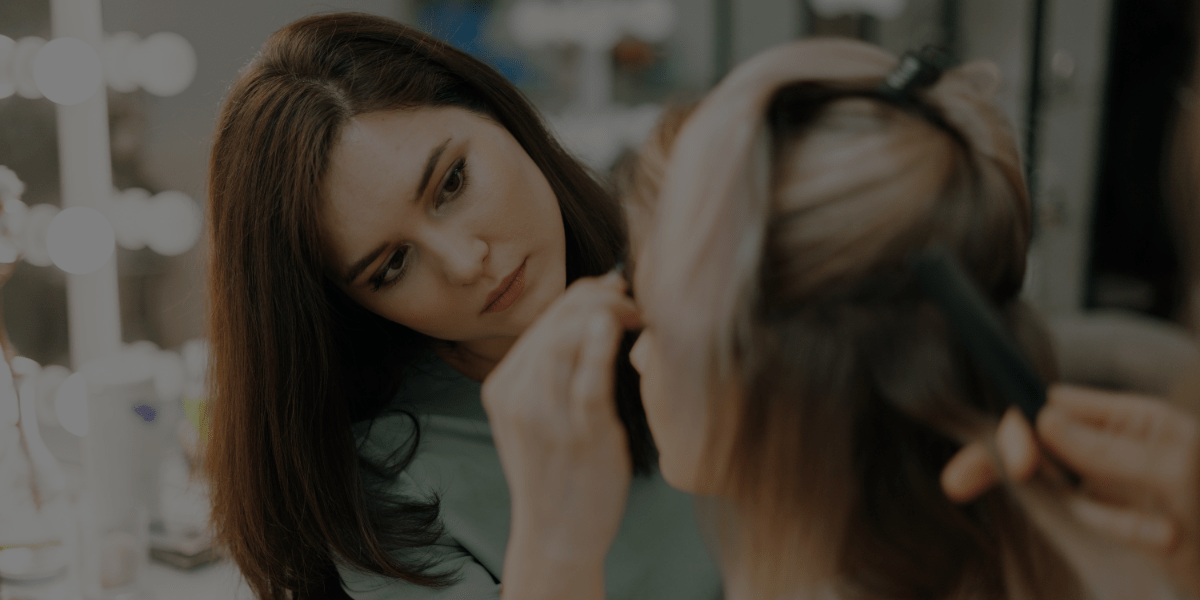Gabrielle Rivera is a QC Makeup Academy graduate and professional makeup artist. To see more of her work, visit her Instagram here.
With YouTube and social media being an immediate source of information, many people might think: “I don’t really need a makeup artist certification. I can just learn from watching videos.”
Although information is easily accessible today, does it necessarily mean that you’re learning the correct information? How can you even be certain that you’re learning from a skilled industry professional?
I myself have learned a lot from watching makeup artists on YouTube. But there are certain things that influencers won’t disclose, explain, or possibly have knowledge of when it comes to a professional makeup business.
For instance, these social media artists mostly apply makeup on themselves, rather than on models. Not to mention, they generally stick with trendy techniques that are popular at that time. You won’t really learn anything about classic technique or makeup theory – both of which are essential if you want to turn this into a career.
If you only learn from influencers or are self-taught, I ask you:
- What about Special Effects makeup?
- Don’t you want to know how to do makeup for film, television, and/or live theater?
- What if you encounter a client with mature skin?
- Do you know how to properly apply makeup on a man?
These are questions to consider when debating if a makeup artist certification is right for you. Here’s my insight as a professional…

4 ways that my makeup artist certification has benefited MY professional career:
1 – Being Seen as a Professional
The beauty industry is a highly saturated field. In order to see your business flourish, you have to be seen and acknowledged – not just as an artist, but as a professional. After all, you want others to take you seriously. If your fellow industry pros acknowledge your proficiency, a lot more opportunities will open up for your business.
With a makeup artist certification, such as the kind you can earn from QC Makeup Academy, you’re learning the side of becoming an MUA that goes far beyond makeup application. When I was earning my own certification, I found that I was able to study and apply business techniques in a real-world setting!
Once potential clients see that you have obtained a legitimate makeup artist certification, they’ll understand that you take your career seriously. Your certification is proof that you took the time to learn more about your craft, and dedicated yourself to providing clientele with the best possible services.
Now, here’s a fun little fact for you: not only does a makeup artist certification help you with clients, it can also help you save money! After graduating from QC Makeup Academy, I was able to apply as a professional MUA for certain online retailers (such as Urban Decay, Sigma, and MAC – just to name a few).
There, I could shop for products at a discounted price! This helps me to regularly restock and build up my professional kit without breaking the bank. I’d definitely call that a great advantage!
2 – Becoming a Legitimate Business
If this is your first time starting your own business, legitimizing it can be a step that often overwhelms and confuses the best of us. However, the right school will ensure you’re properly prepared as you earn your makeup artist certification. In QC Makeup Academy’s courses, for example, you’re provided with an entire unit devoted to Business education.
The Business unit of my certification is one that I valued the most. With that unit, I learned:
- Marketing and promotion techniques
- Tips on working with potential clients
- How to “Seal the Deal” on reluctant clients
- Creating professional contracts
- And so much more!
Although QC’s Business units are technically “optional”, I strongly recommend you take advantage of them. They’re a key component to you knowing how to make your future business legitimate, and run it properly.

As a professional MUA, the skills and tips learned through my makeup artist certification have truly helped me to sell, market, and grow my business. For starters, I’ve had many clients express to me that the professional contracts I’ve developed have set me apart from other makeup artists they’ve worked with in the past!
Likewise, I’ve been able to easily apply the knowledge learned through my course in order to register my business, update my business kit with essentials, and map out financing and bookkeeping for my business.
3 – Contracts and Pricing
One of the biggest challenges you may face as a new artist, or even an experienced one, is setting prices. Something we’ve all experienced when dealing with potential clients is hearing, “Wow, your prices are high,” or, “I know someone who will do it cheaper.”
But you’ve worked hard to obtain your makeup artist certification, and what sets you apart is that you do have proper business training! So, don’t worry. You’ll be able to promote yourself effectively to clients like these in a professional way; one that helps them understand just how valuable your services are.
Obtaining a makeup artist certification allows you to market yourself as a true industry expert who has put the time, training, and research into your craft. This can help you to determine your pricing accordingly, in order to reflect that.
Additionally, make sure that with each client, you always have a professional, written contract. This contract should include your set pricing, policies, and any other critical information relevant to your business and services. A strong contract will provide your client with a sense of comfort; they’ll be able to see that you uphold your business and professionalism to a high standard.
Plus, contracts also protect you and your business when dealing with clients. They’re also a great resource to help you maintain your bookkeeping and business records!

4 – My Clients
Lastly, but just as importantly, you can learn ALL about your clients through a makeup artist certification course.
Clients are the foundation of your business! Knowing how to properly apply makeup to all skin types, face shapes, eye shapes, and for specific platforms is all going to make your business stand out from the rest.
As I mentioned at the beginning of this article, social media can be a great place to learn about techniques and products. However, it also limits you to what’s popular or mainstream – which may not be techniques you can apply for all clients or settings. Social media won’t teach you:
- Which products to use for different skin types and textures
- Makeup theory and foundational techniques
- How to apply makeup for film and television, versus makeup for photography, or makeup for theater
- Etc.
These are all skills you need to have in order to best service your future clients! The more you limit yourself, the more you’ll limit the number of clients you can offer your services to.
If you want to invest in your career and your business, I would highly recommend enrolling in a professional course and getting a makeup artist certification. Personally, I strongly recommend the Master Makeup Artistry Course offered at QC Makeup Academy (which is the course I took)!
The insight learned from this course has set me apart from my peers. Even more than that, it taught me how to become a better boss, a better businesswomen, and a better makeup artist overall.
